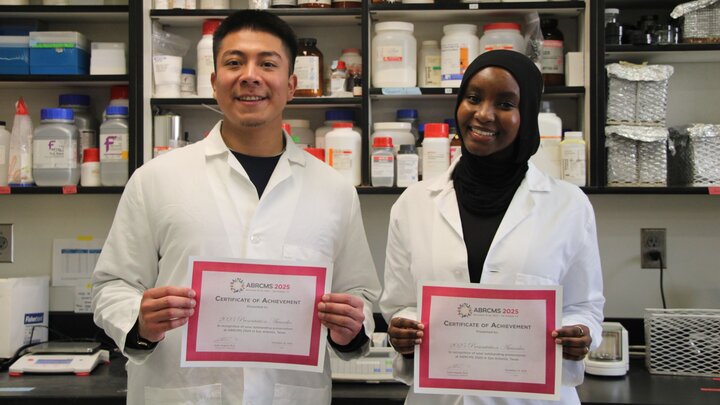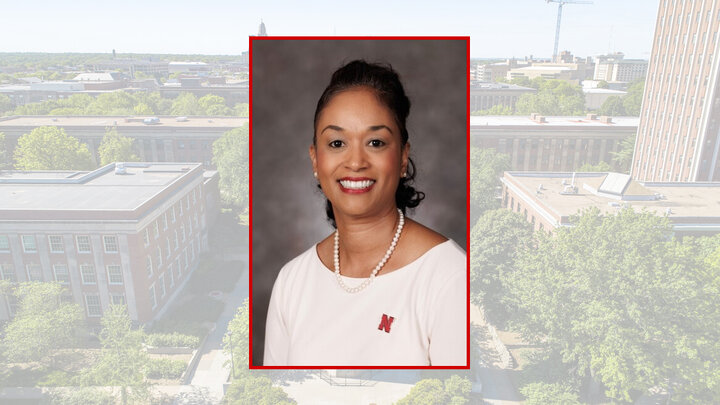Emily C. Moore, assistant professor in the School of Biological Sciences at the University of Nebraska-Lincoln, recently received a nearly $800K award from the National Science Foundation for her project, “Collaborative Research: The role of metabolic conflict and co-adaptation in reproductive success at high elevations.”
Moore’s interest in her field started when she was very young. She shares that her mother was fascinated by genetics.
“I grew up learning about how simple traits are inherited. When I first heard about research into the genetic basis of more complex traits (like height, heart disease risk, or behavior), I knew that was what I wanted to study,” Moore said. “I really like to look to nature to find out what genes do, because we can take advantage of changes to the genome that have been ‘tested’ by evolution.”
Moore teaches General Genetics in the spring and Molecular Genetics in the fall in the College of Arts and Sciences. When not in the classroom or lab, you can find her skating with the No Coast Roller Derby league, working on her 100+ year old house, and spending time with her partner and their four dogs.
In the classroom, she shares how her pedagogical approach is highly interactive, providing her students with experiential learning activities throughout the course so that they are fully equipped with the necessary practical skills when it comes time for them to take their exams.
“General Genetics is really fun because students come from across campus with varied interests, including human medicine, biotechnology, animal breeding, and crop improvement,” Moore said. “It is a class that both builds conceptual and quantitative understanding, which is the perfect mix in my opinion.”
In addition to her classes, Moore works with undergraduate students across a variety of programs in her lab, sharing how they are bringing vital contributions to the work.
“The lab currently has a UCARE student who is doing RNA sequencing on fish brains to see how changes to DNA sequence alter behavior,” Moore said. “We have an Honors thesis student who is carefully sectioning mouse placentas so that we can better understand how the tissues from mom and baby interact. This summer, we also hosted two STEM-POWER students so that they could gain research experience on campus before starting at UNL this fall.”
Moore is thrilled by the nearly $800K in NSF funding she received for her research project on the role of metabolic conflict and co-adaptation in reproductive success at high elevations. The project is in partnership with a professional colleague.
“I have collaborated with Dr. Kathryn Wilsterman at Colorado State University since we were postdoctoral researchers at the University of Montana together,” Moore said. “We have very complementary expertise, with Dr. Wilsterman’s focus on reproduction and pregnancy and my focus on genetics and gene expression.”
The impact of the study could have far-reaching implications for maternal-infant health, which excites Moore.
“High altitude is very challenging for pregnancy. Women living at high elevations in the Andes, Himalayas, and even the Rocky Mountains can experience a higher risk of pre-eclampsia and low fetal birth weight because of the lower oxygen in the air,” Moore explained.
“Deer mice have solved this problem, where mountain populations of mice have healthy pregnancies while their lowland cousins exhibit the same pregnancy complications that can be seen in humans,” Moore noted. “With this research, we are investigating how mountain deer mice protect their pregnancies.”
The project benefits from a two-pronged research approach. “My collaborator, Dr. Wilsterman, will be measuring maternal physiology to identify if mom’s metabolism is protecting the pregnancy. My lab will be examining how the placenta is working to protect fetal growth and metabolism,” Moore said.
Moore is passionate about bringing new perspectives to this area of research. “We hope that our findings will meaningfully contribute to our understanding of how genes from mom and baby work together to protect pregnancy,” Moore added. “This work will serve as foundational knowledge that may one day support interventions to protect pregnancies at high altitude.”
Moore is grateful for funding that will allow for the hiring of a postdoctoral researcher who will contribute as a senior lab mentor, assisting with the research, providing fresh insight, and offering guidance to the graduate and undergraduate students working in the lab.
“We are very thankful to the program officers at the NSF and the scientific panel that reviewed our grant for their support and enthusiasm for this project,” Moore said.




